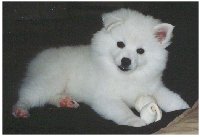Puppy Training: Biting - Stop It Before It Becomes a Serious Problem
Puppies naturally like to bite or nip. This is normal behavior for them, and it's what they do when they play with their littermates. Puppy training, biting problems need to be corrected early before your little puppy grows up and it becomes a much bigger issue! Establish early on that biting or nipping is not acceptable behavior, by using a positive reinforcement and praise method that rewards the puppy for appropriate behavior.
Many young dogs will start to bite as they go through their teething stage. This is the time to start that puppy training / biting behavior modification.
- Do not physically punish your dog. Causing your dog to fear you can actually have the opposite effect that you intended, and can result in aggressive behavior.
 Start by saying, "No!" when your puppy
tries to bite. As soon as he places his mouth on
you, sharply say No! and then redirect your
puppy to an appropriate chew toy. Praise him when
he takes the toy. If your puppy loves to play, then
you can also reward him with a few minutes of play.
Start by saying, "No!" when your puppy
tries to bite. As soon as he places his mouth on
you, sharply say No! and then redirect your
puppy to an appropriate chew toy. Praise him when
he takes the toy. If your puppy loves to play, then
you can also reward him with a few minutes of play.
- Imitate your puppy's littermates - yelp when he bites! Yelp out a high-pitched Ouch! (or whatever word you want to use) when he tries to bite you. Then remove your hand and stop all interaction with your puppy - do not make a fuss, just walk away and don't give him any attention. By doing this you are trying to teach him that it's no fun when he bites since you won't want to 'play' anymore.
- Use a plant mister, set on 'fine mist' and filled with cool water. If your puppy still isn't getting the message using the other two methods, combine it with spraying your dog very briefly at the same time you say No! or Ouch!.
- Be patient. Any type of puppy dog training takes time, and your little one needs the time to understand what you're asking of him.
- Be consistent. Every time your puppy tries to nip you, correct the behavior and then reward him when he stops. Consistency is an important key to success since it reinforces appropriate behavior.
If your puppy's biting behavior is severe, it may be time to consult with a qualified dog trainer or behaviorist. They see dogs with many types of behavior problems and can assist you in determining the best way to modify your pup's biting problem.
